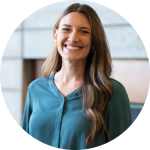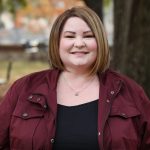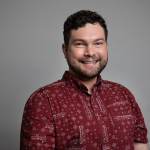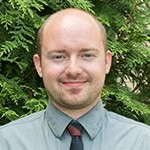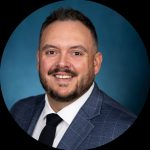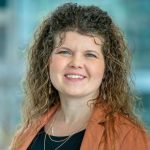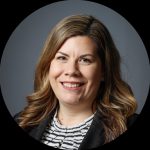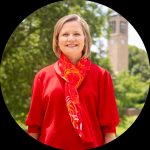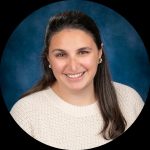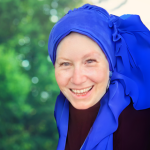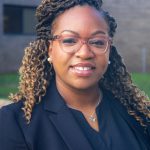Ballots were sent to all active members on Monday, December 9. Please check the email listed on your NODA profile for instructions. If you need assistance, please contact NODA at noda@umn.edu.
Candidates for President-Elect
Candidates for Treasurer
Candidates for General Board Member
Candidate Materials
Marcella Flores
Assistant Director for Student Engagement
Oregon State University (Region I)
- Introduction Video
- Why are you applying for an elected position and what skills/experience will you bring to this role?
With over a decade of active involvement in NODA, I have cultivated a deep understanding of our mission and the critical role we play in supporting, educating and connecting our colleagues across the globe.
My extensive experience includes serving as a Regional Coordinator, hosting regional conferences, and contributing to the Educational Initiatives Committee. I have also been instrumental in the Core Competency Integration Committee, where I helped develop and launch core competency courses. My tenure on the NODA Board of Directors has further honed my leadership and strategic planning skills.
In my current role, I oversee and manage a comprehensive first-year experience program, where my focus on retention from year one to year two. This focus has equipped me with a holistic perspective on student needs and institutional challenges. My management and leadership skills are characterized by organization, adaptability, and a commitment to fostering inclusive and supportive environments. I excel in project management, ensuring that initiatives are executed efficiently and effectively.
Interpersonal skills are at the heart of my leadership approach. I prioritize listening, caring, and incorporating feedback to drive continuous improvement. My background in American Sign Language interpreting has refined my ability to listen and capture diverse voices and insights, ensuring that all perspectives are considered in decision-making processes. I am adept at asking the right questions and interpreting responses to identify gaps and opportunities from a big-picture view.
Interpersonal skills are at the heart of my leadership approach. I prioritize listening, caring, and incorporating feedback to drive continuous improvement. My background in American Sign Language interpreting has refined my ability to listen and capture diverse voices and insights, ensuring that all perspectives are considered in decision-making processes. I am adept at asking the right questions and interpreting responses to identify gaps and opportunities from a big-picture view.
Thank you for considering my application for President-Elect. I look forward to the opportunity to contribute to NODA’s continued success. - In what ways will your addition to the board enhance its diversity and inclusive decision-making?
As President-Elect, I will enhance the board’s diversity and inclusive decision-making by fostering a culture of responsiveness to the evolving needs of our diverse membership. I am committed to challenging the status quo, asking difficult questions, and identifying gaps in our support systems. Higher education, especially in orientation, transition, and retention, can be slow to adapt, but our incoming members—who are more diverse and have changing needs—expect immediate, meaningful change.
My experience across various institutional settings has equipped me with a unique perspective on the challenges students, staff and faculty face in different contexts. I know this is an asset when creating educational opportunities and engagement for our professionals throughout NODA. At Western Oregon University, a small rural liberal arts college, I worked closely with students from rural areas who faced unique access and support challenges. At Portland State University, a large urban public institution, I navigated the complexities of serving a diverse, often non-traditional student body, including many first-generation and international students. Finally, my work at Oregon State University, a large research and land-grant institution, involved decision-making that impacted 30,000 students, requiring collaboration among a wide range of faculty and staff. These experiences have given me a deep understanding of the systemic barriers students and professionals face and how inclusive decision-making is essential for creating equitable opportunities.
I am highly attuned to the need for inclusive decision-making that balances the needs of diverse student populations with institutional priorities. My work has always centered on ensuring that decisions reflect the experiences of marginalized students, from advocating for non-traditional students at Portland State University to ensuring first-generation students are not left behind in retention efforts at Oregon State University. Serving as President-Elect, I will bring this mindset to all decisions, ensuring that we continue to reflect on the broad spectrum of experiences within our diverse members. By actively listening to the concerns of membership, I will ensure that NODA continually adapts and responds to the needs of its members, fostering a more inclusive, connected association. - Please describe your commitment to diversity, equity, and inclusion, both in the professional context of OTR and personally. Provide examples of how you have advocated for and fostered a sense of belonging through DEI initiatives, practices, and strategies in your work.
My commitment to diversity, equity, inclusion, and accessibility (DEIA) is an ongoing journey of self-exploration, learning, and advocacy. I believe creating an inclusive environment requires not only reshaping systems that may hinder growth but also fostering a culture where everyone feels seen, valued, and heard while also meeting their needs.
I start my DEIA commitment through self-reflection, continually exploring my own identity, power, and privilege. This process shapes how I interact with others and informs my approach to my work. Ongoing education, reading, and conversations with peers help me stay informed and advocate more effectively for inclusion. I am committed to understanding how my actions impact others, strengthening my ability to build inclusive environments.
Professionally, I prioritize questioning existing systems to enhance inclusivity and accessibility. I often call myself the “queen of questions” because I believe asking tough questions reveals barriers to equity and opportunities for growth. By critically examining the systems within OTR and NODA, I advocate for practices that make our initiatives accessible to all, regardless of background.
In my nine years on my college’s DEI committee, I developed monthly “article clubs” for professional staff, focusing on research about student identities. These discussions challenge assumptions and expand our understanding, allowing us to better serve diverse student populations. This initiative has helped us grow and support students more intentionally.
One of my proudest achievements is creating Bound for Business, a first-year bridge program for first-generation college students. This program addresses the retention gap between first-generation and continuing-generation students, many from diverse, lower socioeconomic backgrounds. By offering a supportive community and academic resources, Bound for Business helps students build confidence, develop a sense of belonging, and navigate the challenges of higher education.
My DEIA commitment is reflected in both my personal growth and my work with students and colleagues. By challenging systems, creating impactful programs, and fostering dialogue, I will aim to build a NODA where everyone feels they truly belong and they receive the support, education and resources they need to be successful. - Résumé
- Past NODA Involvement / Leadership
Committee Member – Educational Initiatives Committee
Regional Conference Chair
Regional Coordinator
State/Province Coordinator
General Board Member
Committee Member – Regional Coordination Committee
Secretary/Treasurer - Other Relevant Leadership Positions
Volunteer at ORID (Oregon Registry of Interpreters for the Deaf) Conferences from 2012 – 2018
[Back to President-Elect Candidates]
Alison Leach Hughes
Director, New Student Orientation
University of South Carolina-Columbia (Region VI)
- Introduction Video
- Why are you applying for an elected position and what skills/experience will you bring to this role?
I have been a member of NODA since 2009, when I attended my first Annual Conference in Anaheim, California. Then, as a graduate assistant, I had no inkling that I was embarking on a professional journey of a lifetime. Over the last 15 years, I have navigated different institutions and various job responsibilities, but the constant for me has always been my professional home, NODA. The Association has given me more than professional development and knowledge—it has given me community and support.
Being elected as NODA President would be an incredible honor and one that I would not take for granted. There are so many talented members within this Association and as NODA President, my goal would be to listen to our membership, ask critical questions to help move the Association forward, and give back to a community that has given so much to me. I believe in order to be an effective leader we have to know those we are leading. I strive to be a welcoming face, a listening ear, an inquisitive practitioner, and a transparent leader for all NODA members, new to the field or seasoned in the profession.
I have served the Association in various capacities. From Board Member to Regional Coordination Committee Chair, Annual Conference Committee to State Coordinator, it has been an absolute pleasure to work with such inspiring members. During these roles, I have helped cultivate community, listened and acted on membership needs, and helped define the purpose and direction of our Association. In my roles at the University of Arkansas, Florida State University, and the University of South Carolina, I have provided direction for our work, expanded programs to meet our constituents’ needs, advocated for ourselves and programs, and challenged us to think critically and creatively about the future.
I hope to take my experiences as a long-term NODA volunteer and an experienced OTR professional and lean into the possibilities that lie ahead for the Association. I look forward to the opportunity and hope you will join me as we further develop the Association we have come to call home. - In what ways will your addition to the board enhance its diversity and inclusive decision-making?
I make it a point to always consider what voices we have at the table and those that are not represented—whether that is based on identities, lived experiences, roles and responsibilities, institutional types, and more. I believe it is our duty as a Board to represent the diversity of our membership. Throughout my leadership roles within NODA, I try to connect with as many people as possible. While the motivation for that began as a desire for community and belonging, an unintended outcome and significant benefit has been the depth and breadth of perspectives, paths, and processes I have been exposed to. I have made significant effort to use what others have trusted me with as an ally to engage us in discussion, advocacy, and action.
As someone who values strategic thinking and solution-oriented approaches, I enjoy making meaning of what some believe are unrelated. I lead with a strong sense of responsibility and want to do right by others. I think that inclusive decision-making starts by sharing with authenticity and vulnerability, listening with the intent to understand, creating spaces that are accessible, and expanding our networks to include others.
I firmly believe that NODA should be an inclusive community of practice and would strive to continue to lead NODA with this as our constant aspiration. I aim to provide open and honest communication, centering the “why” behind the “what.” I will work to make myself available for all members to ask questions and share concerns. - Please describe your commitment to diversity, equity, and inclusion, both in the professional context of OTR and personally. Provide examples of how you have advocated for and fostered a sense of belonging through DEI initiatives, practices, and strategies in your work.
Diversity, equity, and inclusion work should not fall on one—it is the responsibility of us all. I believe that it should be woven throughout the fibers of our work. I strive to do this throughout our programs and services on my own campus and would hope to do the same if selected to lead NODA as President.
To me, commitment to diversity, equity, and inclusion starts by looking inward. It is important to explore and understand who I am, the identities I hold, and the power and privilege I innately have first. I firmly believe that diversity, equity, and inclusion work is never done. It is a continual process of learning and relearning and requires reflection and self-awareness. To be committed to DEI, we must ask questions, appreciate differences, advocate for others, and elevate voices. When we make mistakes, it is our role and responsibility to acknowledge our missteps, learn from them, and do better.
Throughout my career, I have worked to meet the needs of our diverse student population and their supporters by creating customized experiences that connect them with support and resources for ultimate success. I have implemented publications and programming in other languages, planned events that honor religious holidays and observances, recruited a team more representative of our institution, and revised policies to increase access and accessibility.
As the University of South Carolina Office of New Student Orientation’s motto says, I believe that OTR programs help students feel like they are “right where they belong.” As practitioners in this field, we must create the space for them to feel it and believe it. Similarly, I think NODA is a community that allows a professional to feel that same sense of belonging and I hope, as NODA President, I can create that experience for the next leaders of our field. - Résumé
- Past NODA Involvement / Leadership
Committee Chair – Regional Coordination Committee
Committee Member – Regional Coordination Committee
General Board Member
Regional Conference Chair
Regional Coordinator
State/Province Coordinator - Other Relevant Leadership Positions
NODA Region VI Conference Committee – Graduate Student Experience (2024–2025)
Graduate Student Symposium Panelist (2024)
Orientation Professionals Institute 2.0 Lead Facilitator (2023)
Election Reform Ad Hoc (2021–2023)
Orientation Professionals Institute Panelist (2021)
NODA Board Member (2020–2022)
NODA Region VI Conference Committee – Volunteers (2018)
Regional Task Force Chair (2017)
NODA Regional Coordination Committee Chair (2016–2018)
NODA Internship Host (2016–present)
NODA Region IV Coordinator (2013–2015)
NODA Annual Conference Committee – Marketing and Publications (2013)
NODA Region IV Conference Co-host (2013)
NODA Region IV State Coordinator for Arkansas (2012–2013)
NODA Region IV Conference Committee – Publications, Awards (2012)
Orientation Professionals Institute Participant (2010)
NASPA Undergraduate Fellows Program (NUFP) Mentor (2017–present)
Alpha Chi Omega Alumnae Member – Beta Eta Chapter
Advisor to the Vice President for Diversity, Equity, & Inclusion (January 2021–March 2022)
[Back to President-Elect Candidates]
Devin Carpenter
Director of New Student Success
University of Montana (Region I)
- Introduction Video
- Why are you applying for an elected position and what skills/experience will you bring to this role?
I am a builder, a connector, and an activator, and I know these strengths and mindsets will serve NODA in a variety of ways. What excites me about the opportunity to join the General Board are the ways NODA is currently growing and evolving to better meet the needs of the field of OTR, and empowering us as professionals to adapt.
Across my decade-long career at the University of Montana (UM), I have faced significant leadership turnover, campus political obstacles, and administrative pressure to meet institutional recruitment and retention goals. In 2019, I redesigned our onboarding programs for new students, including building and implementing an experiential welcome week from the ground up. To achieve this, I connected with many areas of campus and brought disparate priorities and opinions together to better support student success and retention. Since then, the program has persisted and evolved, with data showing increased student enrollment and first-time student retention every single year. I am incredibly proud of the pipeline for student success our campus has designed and the dividends it’s paying for our students and our larger community.
In 2022, I was faced with the difficult reality of relieving my Student Ambassadors of their volunteer campus tour duties—a 50+ year tradition on UM’s campus. As a connector, I brought these student leaders, who were reasonably upset with the decision, into conversations to design their pathway forward together. We have successfully repositioned them as first-year mentors who continue serving new students and our campus far beyond orientation and welcome programs.
These experiences remind me that challenges, when approached with an open mind and a “try stuff” attitude, can be solved by bringing people together and leveraging each person’s skills. This mindset, combined with my collaborative leadership, will be essential as NODA navigates the unknowns of discontinuing networks and regions to create new communities and learning opportunities that better serve our members. My focus on innovation and shared goals will support the General Board’s work to reinvigorate membership, align initiatives with core competencies, and embody DEI through action. - In what ways will your addition to the board enhance its diversity and inclusive decision-making?
As an advocate for diverse student needs and experiences, I believe my addition to the NODA Board would enhance its diversity and inclusive decision-making in several impactful ways. The University of Montana is an R1 research institution with a student body of just 10,000, offering a distinct perspective on the intersection of research excellence and the needs of a smaller, tight-knit community. This scale allows for close relationships and personal investment in student success, which I bring to all my work.
Growing up as a military brat, I lived in a multitude of places and was surrounded by people from many cultures and backgrounds. This experience fostered adaptability, open-mindedness, and a deep empathy for individuals from all walks of life. It also taught me how to balance competing needs and work toward solutions that best serve everyone.
Through my role as an admissions counselor, recruiting students across rural Montana, I became acutely aware of the challenges faced by rural communities—such as limited resources and being underrepresented in broader conversations about higher education. Bringing this perspective to the NODA Board will help ensure that the needs of rural students and colleagues are reflected in our decision-making.
I am also deeply committed to advocating for Indigenous communities, an often-underrepresented perspective within NODA. Through strategic realignment of resources, we increased Indigenous student enrollment at UM by 45% since 2018 and are on track to earn the designation of a Native-Serving Institution. Additionally, my collaboration with the seven tribal colleges in Montana and understanding of their communities’ needs would offer valuable insights to the Board.
As a queer person, I recognize the exceptional challenges facing our community, particularly in the current political climate. My lived experience and passion for advocacy enable me to speak directly to the fears and struggles of queer students and colleagues. I am committed to ensuring that marginalized voices are centered in NODA’s work. - Please describe your commitment to diversity, equity, and inclusion, both in the professional context of OTR and personally. Provide examples of how you have advocated for and fostered a sense of belonging through DEI initiatives, practices, and strategies in your work.
For me, the work of equity and inclusion is inextricable from all I do. Within NODA, this means ensuring that we are attuned to the evolving needs of our students, the shifting dynamics of the OTR field, and the diverse voices within our Association’s membership. My approach to DEI is rooted in action—disrupting inequitable systems, questioning the status quo, and creating meaningful, sustainable change.
My bias to action was recently exemplified by my contributions to crafting UM’s Diversity Strategic Plan. Our president outlined five Priorities for Action, within which the Diversity Advisory Council noticed many gaps. We began creating a parallel document noting areas for DEI initiatives, creating “accountable owners” for each, and identifying barriers to progress to ensure successful implementation.
Central to UM’s redesigned welcome week is our partnership with 40+ local organizations. I’ve made it a priority to build relationships with TRiO, All Nations Health Center, Lambda Alliance, and others to support unique student needs and identity groups. To me, this style of grassroots engagement is what instills values of DEI in students. It showcases the breadth of our community and engages students in the process by teaching them how to continue “the work” on their own.
Since 2022, I have served as co-director of Missoula Pride, the largest Pride celebration in Montana. Leading this event has required balancing the disparate needs within the queer community and working across differences to create an inclusive and affirming experience. This ability to bring people together, even amidst unique and sometimes conflicting priorities, is a skill I will bring to NODA as we navigate what will almost certainly be four challenging years as a country and as educators.
Supporting the ever-changing needs of our most vulnerable and underserved populations is something I will actively advocate for within NODA. I will bring this approach to empower diverse membership, foster equity, and ensure DEI remains at the core of our Association’s work. - Résumé
- Past NODA Involvement / Leadership
Committee Member – Regional Coordination Committee
Regional Coordinator
State/Province Coordinator
Committee Chair – Core Competency Committee
Committee Member – Core Competency Committee - Other Relevant Leadership Positions
Since joining NODA in 2017 as part of Region 1, I have consistently sought opportunities to serve and lead within the Association. Shortly after joining, I noticed a vacancy for the Montana state representative role and quickly inquired about applying. I was accepted into the position and began my leadership journey with NODA.
Building on that experience, I pursued the role of Region 1 Coordinator, a position I held from 2020 to 2022. During this time, I worked to keep our region active and engaged through the unprecedented challenges of the COVID-19 pandemic, fostering connection and support among members during a difficult time for the field. After completing my term, I applied to join the Core Competency Integration Committee, where I contributed for about a year before being asked to step into the Chair role in Spring 2023 when then-chair Joe Thomas was elected NODA President-Elect.
In addition to these formal roles, I have supported NODA in other capacities, including serving on regional conference planning teams, facilitating the Student Leadership Institute, and participating in the Association’s staff search committee, which successfully hired our new Director of Education.
Unlike many peers, I have not pursued leadership positions with other associations. My full focus and commitment have been to NODA and its mission. I am deeply invested in the work we do to support students and professionals in orientation, transition, and retention. My leadership roles have allowed me to stay connected to NODA’s evolving needs and contribute to its success in meaningful ways.
As someone who has been involved in NODA leadership since the beginning of my membership, I bring a deep understanding of the Association’s structure, priorities, and potential. I am ready to continue building on this foundation to support NODA’s mission and its members as we navigate the opportunities and challenges ahead.
[Back to General Board Candidates]
Nathan Cheesman
Assoc. Dir. of Student Life: Aggie Welcome & Orientation
New Mexico State University-Main Campus (Region III)
- Introduction Video
- Why are you applying for an elected position and what skills/experience will you bring to this role?
As an OTR practitioner and educational leader, I am applying to the NODA Board of Directors to continue sharing my knowledge with others and giving back to the association. NODA, and similar organizations, fosters the exchange of innovative ideas, research, and best practices, enabling institutions to learn from one another rather than reinvent the wheel. I have worked in OTR at multiple institutions, spanning various types and locations, and bring perspectives from both enrollment management and student engagement. I have had the privilege of engaging with multiple networks, serving on several regional conference committees and the CAS Advisory committee, and holding the role of Region III Coordinator—all of which have prepared me to contribute meaningfully to the Board. In addition to directing an orientation program, I am actively involved in transition and retention work, pursuing a PhD at a Hispanic-Serving Institution, and serving as an association representative to the Council for the Advancement of Standards in Higher Education (CAS). - In what ways will your addition to the board enhance its diversity and inclusive decision-making?
The best way to make inclusive decisions is to ensure all voices are represented. Since the Board of Directors has limited membership, this is often achieved through representative voting and occasional direct member input on decisions guided by the Board or NODA Executive Leadership. For this process to be truly inclusive, the Board must consist of members from all areas of NODA membership who actively engage with the community. Board members should regularly attend events and meetings to connect directly with members, ensuring their decisions reflect the diverse needs and wishes of the association.
The Board of Directors also bears the critical responsibility of maintaining NODA as a functioning and solvent non-profit organization for the benefit of its members. If elected, I would prioritize attending regional and network meetings, fostering direct communication with members, and using their insights to guide inclusive decision-making that puts their needs first.
I bring a broad range of experiences from over 14 years as a higher education professional, working in both OTR and non-OTR functional areas. My career spans public and private institutions throughout the country, including Predominantly White Institutions (PWIs), a senior military institution, and a Hispanic-Serving Institution (HSI), each with unique challenges and priorities. These experiences have reinforced my belief that one-size-fits-all solutions do not work; what benefits one institution type may not benefit another. My experience as a paid staff member of a non-profit organization outside higher education has given me valuable insight into the operational and strategic needs of such entities. This perspective, combined with my professional background, positions me to contribute to NODA’s inclusive, mission-driven decision-making while ensuring its long-term success. - Please describe your commitment to diversity, equity, and inclusion, both in the professional context of OTR and personally. Provide examples of how you have advocated for and fostered a sense of belonging through DEI initiatives, practices, and strategies in your work.
One of the key goals of OTR units is to nurture a sense of belonging for students and their supporters as they join the campus community. This requires intentional efforts to understand and learn about the diverse experiences of those we serve. For me, this means stepping outside my departmental silo to engage with other areas of campus. At my current institution, I’ve immersed myself in the history and traditions of the Southwestern borderlands while understanding the unique perspectives and slang of our Gen Z students. At my previous institution, I focused on learning about military culture and connecting with the Corps of Cadets.
In both roles, I’ve prioritized understanding the political, cultural, and social contexts of the regions I work in, reflecting on how these differ from my own background. Having lived in eight states, I’ve had the privilege of learning local cultural nuances at each stop while bringing ideas and perspectives from other places to enhance DEI efforts. This approach has allowed me to adapt and expand our office’s programs to better support our diverse campus communities.
As the director of orientation programs, I’ve worked to incorporate new ideas from our professional and student staff to adapt programming to the needs of each incoming class. Together, we’ve strengthened support for Spanish-speaking students and families, neurodivergent students, first-generation students, and those questioning their place in college. These efforts have been deeply collaborative, involving partnerships across campus and a shared commitment to continuous improvement.
Through intentional learning, collaboration, and adaptability, I strive to foster an environment where every student and supporter feels valued and connected to their institution. These experiences reflect my commitment to diversity, equity, and inclusion—both professionally and personally—as I work to make the university experience welcoming for all.
- Résumé
- Past NODA Involvement / Leadership
Other - Other Relevant Leadership Positions
CIVSA: Collegiate Information & Visitor Services Association
CAS Representative: January 2024 – present
CIVSA Standards Committee: August 2022 – present
ACPA: College Student Educators International
National Conference Committee Member (multiple sub-committee positions); September 2011 – March 2017
[Back to General Board Candidates]
Joe Colangelo
Director
University of Michigan-Ann Arbor (Region VII)
- Introduction Video
- Why are you applying for an elected position and what skills/experience will you bring to this role?
I am applying to be a member of the Board of Directors because I believe firmly in the work that NODA does to support the growth, learning, and development of members of our field. We provide practitioners with opportunities for learning, development, and a community of best practice so that they may in turn support our students. NODA has been one of the foundational pillars of my career, and I feel a sense of responsibility to contribute to the organization and ensure that others experience the same opportunities for growth and support that I have been the beneficiary of numerous times. I believe that my numerous years of experience within NODA in multiple capacities as well as serving as both an office and divisional leader on my campus, gives me the contextual perspective to provide thoughtful, reflective, and strategic direction to the organization. As we enter potentially turbulent and uncertain times in higher education, the work of NODA is more important than ever, and I want to play an active role in ensuring the health and effectiveness of the organization for years to come through work as a member of the Board of Directors. - In what ways will your addition to the board enhance its diversity and inclusive decision-making?
As I think about my addition to the board and how I can contribute to its diversity and inclusive decision making, I first need to acknowledge that from a perspective of social identities, I primarily hold those that are privileged by society. With this in mind, I need to consistently be cognizant of how I make space for, advocate, and support the experience of others. In terms of the composition of the board in general, I would bring a voice that is currently missing from the group and can represent the large swatch of our membership that comes from the midwest as well as the perspective of a Big Ten member institution, of which we currently do not have a representative. - Please describe your commitment to diversity, equity, and inclusion, both in the professional context of OTR and personally. Provide examples of how you have advocated for and fostered a sense of belonging through DEI initiatives, practices, and strategies in your work.
Diversity, equity, and inclusion is critical to the work that I do professionally and is at the core of my decision making. As a supervisor and someone directing a team of professionals, I work hard to try to recruit, build and support a broad and diverse team that feels valued and empowered in the workplace. I firmly believe that our teams are better when they offer differing perspectives and experiences.
In addition to advocating for and positioning DEI supporting offices and content in both our virtual and in person aspects of our orientation program, in my role, I am afforded the ability to enact change at systems levels, and through policy and programmatic decisions that can have an impact on all students. As I undertook the responsibility of reshaping our orientation program, I centered the values of equity, access, and affordability. Having these three pillars to go back to drove our program towards the current decoupled hybrid model we live in today, offering all students the ability to engage in essential transitional programming and experiences in a phased approach that leverages technology to eliminate a structure that advantaged students with means to travel in the summer, and still affords an opportunity for on campus engagement through creative scheduling alternatives. I have also gone to substantial lengths to structure a program that eliminates financial barriers for students and families, developing a program model that reduced our orientation fee by nearly 50% and established an automated fee waiver process that this past year supported nearly 1000 incoming students.
I also have the unique perspective of veteran and military connected student services falling within my portfolio. In this area, I routinely advocate for more resources, visibility, and opportunities for this community on our campus. Recently, I was able to secure an additional permanent position to help support this population as well as expand programming for military dependent students. - Résumé
- Past NODA Involvement / Leadership
Committee Member – Annual Conference Advisory Committee
Network Chair – Large Institution Network
Committee Member – Fundraising Committee - Other Relevant Leadership Positions
My primary leadership in professional organizations has been within NODA in various roles including multiple regional host committees, two annual conference planning committees, co-chairing the large Institution Network, and serving on the fundraising committee. Earlier in my career, I also served on two conference planning committees for the Great Lakes Association of College and University Housing Officers. In January 2025, I will also begin serving in an Advisor role for the University of Michigan chapter of the Evans Scholars.
[Back to General Board Candidates]
Heather Correa
Senior Coordinator for New Student Programs
University of California-Riverside (Region II)
- Introduction Video
- Why are you applying for an elected position and what skills/experience will you bring to this role?
Hi NODA! For those that I have not met yet, I have served as the lead Orientation professional at the University of California, Riverside since 2014. Shortly after beginning my position I was encouraged to attend the Orientation Professionals Institute and attend my first NODAC. I have continued to be involved and build on my NODA leadership since then. Whether it has been serving as a committee member, SLI Faculty, planning for a regional or national conference, recruiting summer interns or providing information and resources to colleagues in my region, NODA has been a cornerstone in my professional OTR experience. I was elected to serve as the Region II Coordinator in December 2022 right after the announcement of the change to our new community model. This has been a time of a lot of questions and change for our Association, and I have been an active member in providing insight as we develop the structure for our new Place Communities.
My experiences in NODA not only give me the perspective to look at policy and procedures from my own geographic lens but what will benefit the membership as a whole. I was inspired when attending this year’s Leadership Summit in Portland to not only make sure that Region II has a voice at the table but to make sure we are reviewing and updating our policies to support the membership at large. As we continue to move forward in this time of transition, I have decided to apply for a Board position to advocate for our new and seasoned members, provide geographic insight and representation from the Pacific Coast, and support appropriate review or change of current policy to meet our diverse association needs. I truly value the benefits of collaboration and strive to be an active and thoughtful contributor to the board. - In what ways will your addition to the board enhance its diversity and inclusive decision-making?
One of the most important factors in my decision to run for a NODA Board Position is ensuring the there is balanced representation from all geographic regions in our association leadership. The Pacific Coast brings a wealth of knowledge and expertise to our association and representation in NODA leadership is critical in having balanced input and participating in policy change. In addition bringing and sharing important associate updates back to the regions is imperative in encouraging continued involvement and I aspire to be a leader that is accessible to members and inspire future leaders in NODA.
As a professional working at an institution ranked number one in the nation for social mobility with a nearly fifty percent first generation college student population, a commitment to DEI is a cornerstone in my work and will bring the skills to think intentionally to meet the needs of our diverse association membership. I would come to the board with sixteen years of professional experience in the field of student affairs with additional experience serving on non-profit leadership outside of education and student affairs. - Please describe your commitment to diversity, equity, and inclusion, both in the professional context of OTR and personally. Provide examples of how you have advocated for and fostered a sense of belonging through DEI initiatives, practices, and strategies in your work.
A commitment to DEI work means to me that we take the time to pause and think critically about the decisions I make in policy, programming, leadership and personally. The biggest strengths I bring to the table in ensuring equity and inclusion are empathy and communication. Empathy in being able to pause and look at potential impacts from those with identities different from my own and communication to be an advocate. These qualities are what set my foundation in consistently looking at policy and procedures that are accessible and equitable to all, while communicating if said policy needs to be reviewed and updated. One example this past year was setting the conference fees for our Regional Conference. In a time where educational institutions are challenged financially for professional development funds it was important to advocate to keep the registration fee low so that more teams would be able to participate, thus providing more opportunities for our students to engage in discussions from different institutional structures than their own. In the same vein, reviewing how NEF funds are allocated to support aspiring leaders should be reviewed to ensure opportunities are available for staff that might not be able to attend or participate in NODA opportunities without.
- Résumé
- Past NODA Involvement / Leadership
Committee Member – Leadership Development Committee
Student Leadership Institute Faculty
Regional Coordinator
Committee Member – Fundraising Committee
Regional Conference Chair - Other Relevant Leadership Positions
Board Member – Los Angeles Figure Skating Club (2024 – present)
Board Member – Junior League of Riverside (2022 – 2024)
[Back to General Board Candidates]
Jesse Cunion
Assistant Dean, Student Services
Cleveland State University (Region VII)
- Introduction Video
- Why are you applying for an elected position and what skills/experience will you bring to this role?
NODA and its members are doing good and important work; I want to be a part of carrying that work into the future. Over the past decade, through a variety of volunteer and leadership roles, I’ve endeavored to serve members, promote OTR in higher education, and work to continuously improve on the offerings of this organization. Overarchingly, these would be my goals as a Board member. Beyond this, my lengthy career in OTR, as well as my current doctoral work, have provided the opportunity to learn and research the changing needs of HIED and students, the ways OTR can be integral to supporting student success, and about building partnerships across institutions to further OTR initiatives. This knowledge and experience will help as we continue to expand ways to carry out our strategic plan and serve members.
In many ways, we are hitting that mark – our conferences, institutes, and core competency offerings are growing. Yet we must enhance opportunities in T&R, expand into areas of HIED connected to OTR but less focused on (i.e. advising, supporting students with disabilities, AI’s impact on our work), and programs for seasoned professionals. This is not news – NODA leaders are already discussing this – but as a seasoned professional more firmly entrenched in T&R I can provide insight and valuable hands and feet to the cause of advancing our offerings in these areas.
For the past two years, I have been some of the hands feel helping to implement NODA Communities. The amazing current RCs and I were able to submit a Geographic Place Communities proposal nearly six months ahead of schedule, allowing the work of the larger Communities Implementation Committee, on which I also serve, to move forward. I also dove into work on the Educational Initiatives Committee as we look to re-envision Spring Learning and develop undergraduate and graduate learning outcomes for NODA Educational Programs. Having this in-depth knowledge of this work and where it is heading uniquely positions me to help shepherd the association forward into the future. - In what ways will your addition to the board enhance its diversity and inclusive decision-making?
Nothing about my mere presence as an addition on the board, will inherently improve decision-making focused on diversity and inclusion. However, my attitude and approach to tough discussions and decision-making (in my current professional list) certainly can. To me, decision-making that centers inclusion and justice requires diversity at the table. In the context of NDOA, this means people with various social identities and cultural backgrounds as well as those who have varying levels of experience in the field and in specific areas of OTR.
Secondarily, it (decision making centering inclusion and justice) requires the cultivation of an environment where it is necessary and expected to get input from diverse folx, ask questions, challenge assumptions, and push the group into critical thinking in order to ensure the best possible, most inclusive decisions are made. This often means taking time to problematize the ingrained ways of thinking in HIED and problematizing how we can easily fall into structures of neoliberalism and colonialism. As someone who is continuously learning about this myself, I would also strive to be a Board member who demonstrates and encourages that in others – I will be Board member who pushes inclusive thinking, seeks input from diverse others, and works to challenge assumptions and inherent structures to arrive at decisions that best serve all our members as well as our institutions and students. - Please describe your commitment to diversity, equity, and inclusion, both in the professional context of OTR and personally. Provide examples of how you have advocated for and fostered a sense of belonging through DEI initiatives, practices, and strategies in your work.
In my personal and professional life, a commitment to DEI means first acknowledging the privilege in my own life and how much I have yet to learn. The desire to learn and grow more in this area has led me to much training on my own campus and to seek out a graduate program (Ed.D.) with an explicit social justice orientation. Though this, I have grown to focus on working within my sphere of influence to problematize inherent oppression in higher education (and my other environments) with a focus on breaking down the barriers and structures that perpetuate this oppression and stand in the way of success for HIED professionals and college students whenever possible.
Throughout my career, my commitment to DEI has looked like advising and supporting diverse student organizations, implementing training for the students and professional staff, participating on committees and initiatives related to social justice and inclusion on my campus, and doing diversity audits of my functional areas and offices to enable us to plan for improvement.
To be completely truthful though, my commitment to DEI, while earnest and strong, is a work in progress. I need to learn more. I need to do more. Working with an in an organization like NODA, who is also striving for improvement and growth, is an important part of my own development in this area. I look forward to engaging in that important work related to NODA on the Board and in concert with the amazing professionals in this organization.
- Résumé
- Past NODA Involvement / Leadership
Committee Chair – Regional Coordination Committee
Committee Member – Regional Coordination Committee
Regional Conference Chair
Regional Coordinator
Committee Member – Fundraising Committee
Committee Member – Educational Initiatives Committee - Other Relevant Leadership Positions
In the past, I held multiple leadership roles in NACA (National Association for Campus Activities) as well as several leadership roles on my prior campus, including being on two strategic planning committees. Currently, I also serve as co-lay leader of my church and a mentor in CollegeNow of Cleveland.
[Back to General Board Candidates]
Sarah Merrill
Director of New Student Programs
Iowa State University (Region V)
- Introduction Video
- Why are you applying for an elected position and what skills/experience will you bring to this role?
NODA has been my professional home since I began OTR work in 2008. Membership has positively contributed to my growth as a practitioner, leader, and human. I am applying for a General Board Member position to continue to advance the mission and purpose of this important community for OTR professionals and to support change as our needs as members evolve.
On my own campus of Iowa State University as Director of New Student Programs, I led our programs through immense change. Responding to the pandemic, legislation, and developing future state of programs required a willingness to innovate and try things in an entirely different way. I had to develop collaborations – inside and outside of our organization – to achieve a new common goal. Most importantly, it also required I show care – for our staff team, our campus community members, and the students whose lives were being so profoundly impacted. I would plan to bring these qualities of innovation, collaboration, and care to NODA if elected.
Also, my past experiences with NODA would guide me in this role. I have served our association in a variety of capacities regionally and nationally – including Regional Conference Co-Chair and Annual Conference Educational Co-Chair. I also served in a leadership position as Student Leadership Institute Lead Faculty for two years after having served as faculty as well. These positions demonstrate that not only am I willing to do the work of the association to move our ideas forward, but also my commitment to learning and aligning our activities with the strategic mission of NODA. NODA supports OTR professionals at all levels – new and emerging, mid-level, to senior-level. Having been all of these while actively involved in NODA and been able to listen to those in positions different from my own, I believe I can contribute in meaningful ways to the future of our association and our profession. - In what ways will your addition to the board enhance its diversity and inclusive decision-making?
As a member of the NODA board, DEI would be front of mind to me in furthering our work as an association, guiding my decision-making, and developing opportunities for its members. My experience leading diverse teams and developing community at a predominantly white institution translates to the important week needing to done within NODA to expand access and inclusion amongst our members. Additionally, my identity as a person with a disability provides unique insight for this often unseen population as we work to develop programs and opportunities that serve all our members, including serving diverse learning styles or integrating accommodations to help our members thrive. - Please describe your commitment to diversity, equity, and inclusion, both in the professional context of OTR and personally. Provide examples of how you have advocated for and fostered a sense of belonging through DEI initiatives, practices, and strategies in your work.
DEI is the foundation on which all other work must be built. For me, it means ensuring an equitable place where students and staff are welcomed and supported for their unique identities and backgrounds. In addition, it means examining institutional and societal barriers and developing policies and practices that create an inclusive environment where everyone can succeed.
In my role as Educational Co-Chair for the Houston Annual Conference, I worked to ensure quality educational sessions were offered on this important topic, and that DEI was incorporated not only as a session topic but incorporated into as many sessions as possible.
Some examples from my work in which I have demonstrated a commitment to DEI are utilizing universal design in all programming, partnering to develop new program content for first-generation and income-eligible students, increasing the use of captioning and assistive listening devices, expanding programming for underrepresented populations, developing menus that support special diets, and demonstrating the value of DEI through student and staff training. In addition, I have been challenged to lead with integrity and build supportive transition programs for all students during a time when our state legislation challenges the very core of my personal and professional value system. I am resolute.
More importantly, this work is never done. I challenge myself to be a lifelong learner and learn from personal interactions and both formal and informal learning opportunities.
- Résumé
- Past NODA Involvement / Leadership
Regional Conference Chair
Student Leadership Institute Faculty
Student Leadership Institute Lead Faculty - Other Relevant Leadership Positions
Iowa State University Emerging Leaders Academy
Iowa State University Cardinal Women
[Back to General Board Candidates]
Aileen Schatz
Director of the First-Year Experience
Union College (Region IX)
- Introduction Video
- Why are you applying for an elected position and what skills/experience will you bring to this role?
I am applying for a position on the Board of Directors because of my deep commitment to NODA’s mission and the value it brings to its members. NODA has been my professional home since I was a graduate student, and I firmly believe that I can make a meaningful contribution as a Board Member. I am enthusiastic about the opportunity to take on this leadership role within NODA and to contribute to the organization’s continued growth and excellence in the field of orientation, transition, and retention.
My current and past roles have provided me with invaluable experience in managing substantial budgets, setting internal and external policies, and providing clear guidance for critical programs. I have actively participated in NODA since joining in 2014. I currently serve as a member of the Scholarly Practice & Resources Committee, and previously served on multiple NODA Region IX Conference Committees and co-hosted the 2020 NODA Region IX Conference. This involvement has provided me with an understanding of NODA’s structure, values, and needs of its members. It has also given me insight into the strengths and opportunities for growth within NODA.
I am dedicated to serving as a resource for NODA members. In my roles within Region IX, I have provided guidance and mentorship to fellow professionals in the OTR field. I have also found and connected with phenomenal professional mentors because of my involvement in NODA, as a NODA intern, an OPI participant, and more. I am passionate about supporting the growth and professional development of NODA’s members, and I see this role as a platform to expand upon and strengthen these efforts. I bring to the table effective communication and collaboration skills. These skills are essential for interacting with various stakeholders, to ensure productive interactions and information flow between the board and its members.
My experience, skills, and passion for the field, align well with the responsibilities and expectations of a NODA General Board Member. I am eager and deeply committed to NODA’s goals and am excited about the prospect of contributing to its continued growth and excellence. - In what ways will your addition to the board enhance its diversity and inclusive decision-making?
My addition to the board will enhance its diversity and inclusive decision-making by bringing a commitment to fostering spaces where diverse voices are elevated and respected. My professional experience has focused on recruiting and supporting leaders who reflect the identities and experiences of the communities they serve, ensuring that decision-making incorporates a range of perspectives.
Additionally, I approach challenges with a collaborative mindset, actively seeking input from others and advocating for processes that promote equitable access and opportunity. I also bring the perspective of a professional working at a trimester schedule, small liberal arts college, which often differs from the experiences at larger institutions. This perspective allows me to advocate for policies and strategies that address the unique challenges faced by smaller institutions while ensuring inclusivity across all member contexts.
Having worked in environments with diverse populations, I understand the importance of crafting decisions that are both inclusive and responsive to the evolving needs of those we serve. On the board, I would prioritize creating an environment where members feel heard and valued, ensuring that decisions reflect NODA’s commitment to equity and inclusion. - Please describe your commitment to diversity, equity, and inclusion, both in the professional context of OTR and personally. Provide examples of how you have advocated for and fostered a sense of belonging through DEI initiatives, practices, and strategies in your work.
My commitment to diversity, equity, and inclusion (DEI) is rooted in my belief that every individual deserves to feel seen, respected, and valued. Professionally, I have embedded DEI into every aspect of my work, especially in OTR, where building a sense of belonging is critical during students’ transitions to college.
One key strategy I’ve implemented is the intentional recruitment of diverse student leaders for orientation teams. By selecting leaders who reflect the backgrounds and experiences of incoming students, I’ve helped new students see themselves represented in leadership roles, fostering stronger connections and community. For example, I’ve adapted hiring practices to ensure that applications and interviews assess not only skills but also lived experiences that contribute to the team’s diversity and inclusivity.
In addition to working with students, I’ve advocated for equitable hiring practices on professional search committees. I’ve helped ensure diverse representation on these committees, as well as transparency and equity throughout the selection process.
Personally, I embrace DEI work as a lifelong journey. I know I must acknowledge mistakes, listen to others, and continue to seek to learn and grow. I actively work to create spaces where differences are celebrated and everyone can find a sense of belonging. Through this work, I aim to contribute meaningfully to a culture of equity and inclusion on my campus, in OTR, and beyond.
- Résumé
- Past NODA Involvement / Leadership
Regional Conference Chair
Student Leadership Institute Faculty
Committee Member – Research Committee - Other Relevant Leadership Positions
While I hold memberships in other associations, including NASPA and ACPA, my volunteer efforts have been dedicated primarily to positions and opportunities within NODA. I have intentionally focused my time and energy on contributing to NODA because it has been my professional home since graduate school, and I deeply value the mission and impact of the organization that have helped me become the professional I am today.
[Back to General Board Candidates]
Sarah Shannon-Mohamed
Director of Onboarding and New Student Programs
Central Carolina Community College (Region VI)
- Introduction Video
- Why are you applying for an elected position and what skills/experience will you bring to this role?
I am applying for this elected position because I am deeply committed to the mission of the Association and want to contribute to its growth and success. Through my personal and professional experiences, I have developed a strong appreciation for the importance of leadership, strategic planning, policy review and development, and effective communication in fostering an organization’s impact on its members. I am motivated to serve because I understand the need for clear guidance and vision. With my background in higher education, including leadership roles involving project management, strategic planning, and team development, I have led initiatives that directly align with the responsibilities outlined for the Board. In my current role, I collaborate with my team to design and implement strategic plans that support student success, enhance departmental collaboration, and drive organizational goals. This has given me a clear understanding of the necessity for direction and deliberate action in both short- and long-term planning.
I have extensive experience in overseeing the development and execution of plans that align with organizational vision. I’ve worked across multiple departments, collaborating with teams and committees to ensure alignment with strategic goals. As a liaison between teams and higher administration, I’ve facilitated smooth communication and follow-through on key initiatives. This experience will be beneficial in managing information flow across committees, ensuring the Board remains well-informed and aligned with strategic objectives. Additionally, my background in managing staff and volunteers has equipped me to provide direction and support in ways that encourage collaboration and empower individuals to take ownership of their roles. This aligns with the Board’s responsibility to guide the Executive Director and ensure the success of staff.
My commitment to attending conferences, engaging in ongoing learning, and staying connected to the needs of Association members will allow me to be an active and engaged participant in Board meetings. I am excited about the opportunity to bring my energy, enthusiasm, and dedication to this role and contribute meaningfully to the Board’s work. - In what ways will your addition to the board enhance its diversity and inclusive decision-making?
My background as a first-generation, non-traditional student has shaped my understanding of the diverse needs and challenges faced by individuals from various backgrounds. I bring this personal experience, combined with my professional journey, to the table in a way that allows me to advocate for diversity and inclusion in the context of serving members of the Association. Through my leadership roles in higher education, I’ve worked directly with a wide range of individuals, ensuring that their voices are heard, valued, and represented in decision-making processes. In my current position, I collaborate with a diverse set of faculty, staff, and students, navigating complex challenges and ensuring inclusive participation in decision-making. I’m committed to fostering environments where individuals feel comfortable sharing their perspectives and know that they are contributing to the broader mission. This philosophy translates well into the board’s work, where inclusive decision-making and diverse viewpoints are critical to the Association’s success.
My ability to connect with individuals from various backgrounds allows me to approach decision-making from a holistic perspective. I have experience leading teams and initiatives that require balancing competing priorities while maintaining a focus on inclusivity. I’ve developed strategic plans that reflect diverse needs and involve key stakeholders in the process, ensuring that our actions are informed by multiple viewpoints. This experience will enhance the Board’s work by ensuring that the needs of all members are considered and represented in the formulation of the strategic plan and policy decisions. Additionally, my leadership style is grounded in servant leadership, which focuses on empowering others, providing support, and fostering a culture of respect and collaboration. By applying these principles to the Board’s decision-making, I aim to contribute to a more inclusive environment where all members feel heard, supported, and involved in the Association’s growth. - Please describe your commitment to diversity, equity, and inclusion, both in the professional context of OTR and personally. Provide examples of how you have advocated for and fostered a sense of belonging through DEI initiatives, practices, and strategies in your work.
Throughout my career, I have actively sought opportunities to contribute to associations and initiatives that align with my passion for supporting others and fostering inclusive communities. One of the most impactful experiences has been my involvement with NODA’s Diversity and Inclusion Committee, where I am helping to develop the Five-Star Guide to Inclusive Planning. This resource will empower members to intentionally incorporate equity and inclusion into event planning and programming, ensuring that diverse voices are represented and celebrated. In my current role, I have expanded this commitment through initiatives like Sisters in Success (SIS), a program I founded to create a sense of belonging and empowerment for underrepresented populations. This program has been instrumental in providing mentorship and fostering leadership among participants, aligning with my broader goal of creating opportunities for those who may not have historically had access to them.
Additionally, in my personal life, I have served as a social media advocate, using my self-healing platform to guide individuals from all backgrounds through the challenges of processing grief, managing heavy emotions, and navigating healing journeys.
Through this work, I have cultivated a community of connection and support, further reinforcing my commitment to creating inclusive spaces both personally and professionally. These experiences reflect my dedication to empowering others, fostering inclusion, and leveraging resources to drive meaningful change—values I carry into every role I undertake. Whether working with colleagues, students, or professional associations, I strive to build environments where all voices are valued.
- Résumé
- Past NODA Involvement / Leadership
Committee Member – D&I - Other Relevant Leadership Positions
In addition to the leadership roles highlighted in my NODA profile, I have served in various volunteer capacities that reflect my commitment to strategic guidance, student development, and organizational growth. I worked with the Carolina Women’s Center, where I was actively involved in reshaping policies, reviewing the mission statement, and establishing both annual and multi-year goals. This role emphasized the importance of aligning organizational priorities with its mission to foster inclusivity and sustainability. I have also contributed significantly to Phi Theta Kappa (PTK) through multiple roles. As a member of the PTK Advisory Board, I provided guidance on strategic planning and priorities while advocating for PTK members and their mission at the institutional level. My responsibilities included evaluating how the organization serves its members, ensuring its direction remains relevant and impactful, and acting as a liaison between PTK headquarters and college leadership. Additionally, I serve as a PTK Alumni Advisory Board Member, where my role includes offering strategic guidance and professional expertise to help shape PTK’s programs and initiatives.
In this capacity, I focus on mentoring current students through workshops and networking opportunities, fostering alumni engagement by organizing events and promoting participation, and supporting fundraising efforts by advocating for donations and identifying potential donors. I also use my professional platform to promote the value of community colleges and advocate for PTK members, ensuring the organization remains a vital resource for student success. These experiences have equipped me with a broad perspective on strategic leadership, program development, and fostering connections among diverse stakeholders.
[Back to General Board Candidates]
LaToya Stackhouse
Dean of Students
Gordon State College (Region VI)
- Introduction Video
- Why are you applying for an elected position and what skills/experience will you bring to this role?
NODA is one of several organizations that I have had the fortune of being a member. However, it is through NODA that I have the opportunity to work closely with the areas of which I am most passionate: orientation, transitions and retention. In such a short amount of time, I have been involved in NODA through several volunteer and paid positions. I would love to get involved in a more active way. I am currently active as a member of my alumni board and serve on the board of NASPA’s Black Diaspora Knowledge Community. I love contributing the the strategic goals of not only my current institution but my alma mater. The work that we do helps to push the institution’s mission and strategic plan to better serve our students and alumni. - In what ways will your addition to the board enhance its diversity and inclusive decision-making?
Throughout my career, I have dedicated my time and service to justice, equity, diversity and inclusion. During my tenure as Director of Residential and Campus Life at Georgia Southwestern State University, I have served as the Chairwoman for the President’s Council on Diversity, enacted a Multicultural and Diversity Committee within the division and coordinated various cultural excursions for students in both Georgia and Alabama.
I have extensive experience with the Federal TRIO program, Upward Bound which allowed me the opportunity to work with low-income, first generation and student with disabilities. Moving into senior-level positions placed me in spaces to put more actionable items in place to assist students who are often forgotten or neglected in the academic process. Having oversight over areas where these students live and engage, I was able to place programs and initiatives that would provide the additional support that our students needed. The student leaders on the campus were majority first-generation students, so having the reconstructed leadership courses provided a cohort of students where students were able to share their experiences and support one another. The creation of The Brotherhood as a living and learning community was possible because of my access to data and spaces on campus where issues emerged or were pointed out by administration. I continued this work throughout my time as Director of Student Affairs at Florida State University and now at Gordon State College as Dean of Students. Each institution presented new opportunities to educate the community on the needs of the campus.
My dissertation work was dedicated to contributing the voices of Black women on college campuses. My research adds to the body of literature about Black woman subjectivity. My emphasis in Curriculum Studies was Multiculturalism and Social Justice. I will continue this scholarly work through practice and publications. Future practices include focusing on first-generation, limited income and students needing accommodations. Often the diverse needs of these populations are overlooked and misunderstood when they may face various obstacles along the academic journey. - Please describe your commitment to diversity, equity, and inclusion, both in the professional context of OTR and personally. Provide examples of how you have advocated for and fostered a sense of belonging through DEI initiatives, practices, and strategies in your work.
I have recently been involved in facilitating a NODA course which allowed me the opportunity to connect with peers from across the country. The experience was rewarding, and I was elated at the opportunity to continue connecting with NODA and resuming the conversation about DEI. This led to my recent involvement with the D&I committee at NODA. Within my current and former institutions, I have worked to create inclusive spaces where students can develop a greater sense of belonging. I have worked with colleagues to create a living and learning community for first-year Black males. This LLC has completed a space for Black males to grow and thrive with some stepping into student leadership roles across the campus.
My current team has also worked to have a diversified group of student leaders that are relatable to first-year students. Creating such a space had a profound effect on orientation, transition, and retention. We have expanded our concentrations to include first-generation students by creating a specified LLC and this summer a focused NSO. Recently, I have been working closely with our Accessibility Office and Facilities team to help educate others on the importance of ADA-compliance versus accessibility. Through this partnership, we have worked to make our campus more accessible.
- Résumé
- Past NODA Involvement / Leadership
Committee Member – D&I - Other Relevant Leadership Positions
NODA’s Diversity and Inclusion Committee (2024-present)
Program Reviewer 2023-2024
NODA Panelist – Centering Equity in Well-being: Systems Approaches to Student Success (2024)
NODA Panel Moderator – DEI in OTR: The Sequel (2024)
Emerging Leaders Facilitator for DIA and the Law (2024)
Core Content Creator – Diversity, Inclusion and Access (2023)
Course Facilitator – Diversity, Inclusion and Access (2023)
[Back to General Board Candidates]
Kevin “KP” Perry
Director of the Tatkon Center for New Students
Cornell University (Region IX)
- Introduction Video
- Why are you applying for an elected position and what skills/experience will you bring to this role?
I am beyond excited to run for the position of NODA Treasurer. As a seasoned higher education professional with twelve years of progressive responsibilities and leadership, a strategic thinker, and an innovative and passionate leader. NODA has meant so much to me and has consistently felt like my professional home. As my leadership and career in OTR has grown, my focus has been on giving back to an organization and community of individuals that have given so much to me.
During my time as a General Board Member, I have had the pleasure of serving as the liaison to the finance committee. Here I was able to continue my passion for understanding the financial strategies of the Association, helping to guide budget and policy decisions, and helping to ensure the financial future of NODA.
As the Director of the Tatkon Center for New Students at Cornell University, I practice thoughtful fiscal planning and strategic prioritization to ensure resources align with both immediate and long-term organizational objectives. This role demands a high level of financial insight, as well as the ability to make informed decisions that maximize impact while maintaining accountability. My experience in fiscal priority planning has been pivotal in guiding where we invest our time and resources as a department enabling sustainable growth. From managing ongoing expenses to forecasting future needs, I have developed a strategic approach to budgeting that supports innovation while being fiscally responsibility, especially in today’s higher education.
Having worked across a range of institutions — small private to large research — each its own financial landscape and priorities, I bring a unique perspective to the NODA Treasurer role. At each institution, my budget oversight responsibilities helped me learn to adapt to diverse fiscal structures and resource constraints while still achieving our goals as a department. This experience has sharpened my ability to identify and leverage opportunities within varied financial environments, fostering calculated risks, fiscal flexibility, and resilience. - In what ways will your addition to the board enhance its diversity and inclusive decision-making?
By bringing a broad range of institutional experience, cultural awareness, and a deep commitment to fostering belonging for all members, I would work to continue to enhance diversity and inclusion in our decision making. Having worked across small, mid-size, and large institutions, I understand the unique needs and diverse perspectives facing these professionals allowing me to advocate for decisions that are representative of the associations vast membership. My experiences have driven my passion for engaging in discussions that recognize and address differences in institutional resources, student demographics, and program goals, ensuring that our decisions are inclusive and equitable. - Please describe your commitment to diversity, equity, and inclusion, both in the professional context of OTR and personally. Provide examples of how you have advocated for and fostered a sense of belonging through DEI initiatives, practices, and strategies in your work.
I am deeply committed to diversity, equity, and inclusion in NODA and in my work professionally. This commitment shapes my approach to creating welcoming, inclusive environments where students and colleagues feel valued, supported, and empowered.
In my work in OTR, I have developed multiple initiatives that prioritize belonging and inclusivity, including a program at my former institution called “We Are IC”; a story-sharing program where staff and young alum presented an experience at IC through the lens of an underrepresented identity they hold, followed by small group debrief led by the orientation student staff. This program went on to win Region IX’s 2020 Innovative Program Award.
At my current institution, I collaborate across departments to design orientation programs that acknowledge and celebrate diverse identities, creating spaces where students from all backgrounds can connect and feel seen. By working with campus partners, we’ve expanded culturally responsive programming to foster a deeper sense of belonging for new students, especially those navigating predominantly white institutions.
Personally, I am committed to ongoing learning and self-reflection to deepen my understanding of DEI issues. I regularly engage in workshops and readings to confront my own biases and enhance my ability to support marginalized voices in both my work and personal life.
- Résumé
- Past NODA Involvement / Leadership
Network Chair – Highly Selective Institutions Network
Regional Conference Chair
General Board Member
Committee Member – Finance Committee
Committee Member – Internship Advisory Committee


